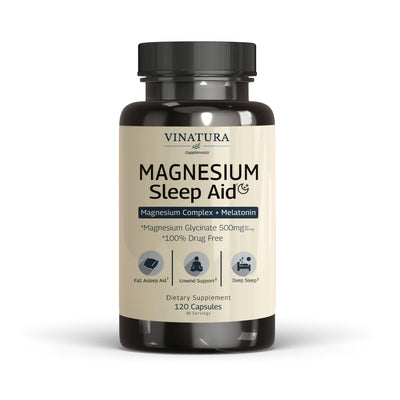
Holy Basil Vs Ashwagandha: Is it Better to Combine Them?
Holy Basil vs Ashwagandha are two herbs commonly used to improve overall health in men and women. So, should we choose one of these herbs or combine them to enhance their benefits and effectiveness? Let's compare them and provide a clear answer in today's article.
Before exploring further, please read the disclaimer located at the end of this webpage.
Key Takeaways
- Ashwagandha is an adaptogen with many excellent health benefits, especially in improving stress and concern and enhancing sleep quality.
- Holy Basil is also a multifunctional adaptogen for health, and this herb also improves sleep and reduces user stress and nervousness.
- Combining Holy Basil and Ashwagandha can optimize their benefits, but they should be used in appropriate dosages.
What are Ashwagandha's Benefits?

Ashwagandha is a natural adaptogen, also known as Withania somnifera. This plant is one of the most essential herbs in Ayurveda medicine, which highlights its potential benefits such as:
Improving stress and nervousness: Ashwagandha significantly reduces cortisol levels, thereby improving stress and anxiety helping to relax and calm the mind. [1] [2]
Enhancing brain function: Ashwagandha can transmit cholinergic signals in the cortex and forebrain. Additionally, it increases muscarinic acetylcholine receptor capacity in the cortex, thereby improving memory. [1]
Improving muscle health: This herb also promotes muscle differentiation and recovery after injuries thanks to its main compound, withanolide. Ashwagandha is often used to enhance health for athletes and people engaged in intense sports. [5]
How Does Ashwagandha Impact on Stress, Sleep and Anxiety?
As mentioned earlier, Ashwagandha is a renowned adaptogen in traditional medicine. Adaptogens are natural substances known for helping the body adapt to stress and nervousness and protecting it from harmful environmental factors. Therefore, Ashwagandha also has specific benefits that are detailed in the following study. [6]
Study Context: An 8-week study conducted in 2019 involved 60 adults with stress (both men and women). They were randomly divided into three groups, receiving doses twice daily: Group 1 received 125mg of Ashwagandha extract, Group 2 received 300mg of Ashwagandha extract, and Group 3 received a placebo.
Evaluation Criteria:
- Stress: Measured by perceived stress scores at baseline (>20), after four weeks, and after eight weeks.
- Anxiety: Assessed using the HAM-A scale.
- Sleep Quality: Evaluated using the 7-point sleep quality scale.
- Blood Cortisol Levels: Measured at baseline and after eight weeks.
Results:
- Reduced Stress: Compared to baseline stress scores (>20), significant reductions were observed in Groups 1 and 2 (125mg/day P < 0.05 and 300mg/day P < 0.0001).
- Reduced Cortisol Levels and Anxiety Symptoms: Significant reductions were observed in cortisol levels and anxiety symptoms in Groups 1 and 2 after eight weeks.
- Improved Sleep Quality: Participants using Ashwagandha showed better sleep quality than placebo participants.
What are the Holy Basil Benefits?

Holy Basil (or Tulsi) is also a natural adaptogen, a renowned herb in ancient Ayurvedic medicine. This plant is famous for its multifunctional benefits in traditional medicine. It has been extensively studied, demonstrating potential health benefits such as:
Stress Reduction: As an adaptogenic herb, Holy Basil significantly reduces stress, helping users adapt to environmental changes that cause stress. [5] [6]
Enhanced Immune System, Endurance: Holy Basil strengthens the immune barrier, enhances resistance, and supports improved user endurance and performance. [5]
Improved Digestive System: Holy Basil is crucial in promoting healthy digestion, aiding metabolic processes, and maintaining ideal weight levels. [5] [6]
How Does Holy Basil Impact Stress, Sleep, and Anxiety?
In a 2009 study, the effects of Holy Basil on reducing stress and improving sleep and nervousness were evaluated among 35 participants (average age 38.4, including 21 males and 14 females). [7]
Study Method: Participants were selected using the modified Hamilton Psychiatric Rating Scale with a 7-point system. They were administered 500mg capsules of Holy Basil extract twice daily for 60 consecutive days.
Evaluation Criteria: Stress and anxiety levels were assessed at three points: before use, after 30 days, and after 60 days.
Study Results:
- Anxiety Improvement: Initial anxiety scores were 84.42 ± 7.56. After 30 days, there was a 19.2% reduction (68.17 ± 7.84), and after 60 days, a 34.2% reduction (55.54 ± 7.20).
- Stress Reduction: Initial stress scores were 95.65 ± 8.42. After 30 days, there was an 11.5% reduction (84.32 ± 9.08), and after 60 days, a 27.5% reduction (68.45 ± 9.60).
- Depression Reduction: Initial depression scores were 66.45 ± 5.68. After 30 days, there was a 13.2% reduction (57.65 ± 5.04), and after 60 days, a 30.8% reduction (45.97 ± 6.27).
Additionally, there were improvements in adaptability and concentration for users. While the study did not demonstrate improvements in sleep quality, based on the benefits above of Holy Basil, it indirectly suggests potential benefits for improving users' sleep quality.
Can You Combine Holy Basil and Ashwagandha?

Yes, you can combine Holy Basil and Ashwagandha to achieve optimal effectiveness in improving stress, sleep, and concern. However, this combination should be undertaken under the guidance of a qualified healthcare professional to avoid health risks.
How Can You Combine Holy Basil and Ashwagandha Safely?
To safely combine Holy Basil and Ashwagandha, you can consider dosages used in previous studies:
- Holy Basil: 1000 mg/day
- Ashwagandha: 300-600 mg/day
Note: Throughout the combination process, monitor your body's reactions closely. Remember to consult a doctor to create the most suitable plan and dosage for your specific needs.
Ashwagandha vs Holy Basil: Which is Better for the Mind?
Based on the two studies above, aside from its benefits in reducing stress and concern, Holy Basil appears to have practical effects on mental clarity, aiding users in enhancing adaptability and concentration. On the other hand, Ashwagandha is expressly noted for its ability to improve sleep. In contrast, its different effects on mental aspects need to be demonstrated.
Conclusion
Holy Basil vs. Ashwagandha is an excellent solution for managing stress and anxiety and improving sleep for users. To maximize effectiveness, consider using a combination of these two products under the guidance of a healthcare professional.
References
- [1] Scientific Basis for the Therapeutic Use of Withania somnifera (Ashwagandha): A Review MD (Ayur), PhD, Betsy B. Singh, PhD, Simon Dagenais Lakshmi-Chandra Mishra,, BA https://citeseerx.ist.psu.edu/document?repid=rep1&type=pdf&doi=2bdff82eb23a373885252c87b53135b2fc9adde4
- [2] An overview on ashwagandha: a Rasayana (rejuvenator) of Ayurveda Narendra Singh 1, Mohit Bhalla, Prashanti de Jager, Marilena Gilca DOI: 10.4314/ajtcam.v8i5S.9
- [3] Effect of Ashwagandha Withanolides on Muscle Cell Differentiation Biomolecules 2021, 11(10), 1454; https://doi.org/10.3390/biom11101454
- [4] Adaptogenic and Anxiolytic Effects of Ashwagandha Root Extract in Healthy Adults: A Double-blind, Randomized, Placebo-controlled Clinical Study Cureus . 2019 Dec 25;11(12):e6466. doi: 10.7759/cureus.6466.
- [5] Usage of Holy Basil for Various Aspects Raaz Maheshwari1, Bina Rani2, Rajesh Kumar Yadav3, Magan Prasad4 Online ISSN 2277 – 1808 Bull. Environ. Pharmacol. Life Sci.; Volume 1 [10] September 2012: 63 - 65
- [6] Basil: A Brief Summary of Potential Health Benefits Singletary, Keith W. PhD Author Information Nutrition Today 53(2):p 92-97, 3/4 2018. | DOI: 10.1097/NT.0000000000000267
- [7] Controlled programmed trial of ocimum sanctum leaf on generalized anxiety disorders D Bhattacharyya,1 TK Sur,1 U Jana2 and PK Debnath2 Nepal Med Coll J 2008; 10(3): 176-179
Author

Product Disclaimer
The dietary supplement products mentioned on this website are formulated based on scientific research and adhere to FDA guidelines for dietary supplements. However, the content of the articles has not been evaluated by the Food and Drug Administration (FDA) and is not intended to promote or endorse any specific product. Any products sold on this website are not intended to diagnose, treat, cure, or prevent any disease.
Opinions and Endorsements
Any claims, statements, or opinions expressed in the articles are those of the author(s) and do not necessarily reflect the views or opinions of the manufacturers of the dietary supplement products. The products sold on this website are separate from the content of the articles and are not directly endorsed or associated with the information presented here.
Liability Disclaimer
The author(s) of the articles, website, and manufacturers of the dietary supplement products do not assume any liability for any potential consequences arising from the use of the information provided in the articles. It is recommended that individuals consult with a qualified healthcare professional before making any dietary or lifestyle changes, including the use of dietary supplements.
Product Usage
Please refer to the product labels and packaging for specific usage instructions and guidelines for the dietary supplement products sold on this website.
Customer Support
For any concerns or questions regarding the dietary supplement products, please contact our customer support team, who will be more than happy to assist you.





Leave a Comment
Be the first to comment.
What do you think?